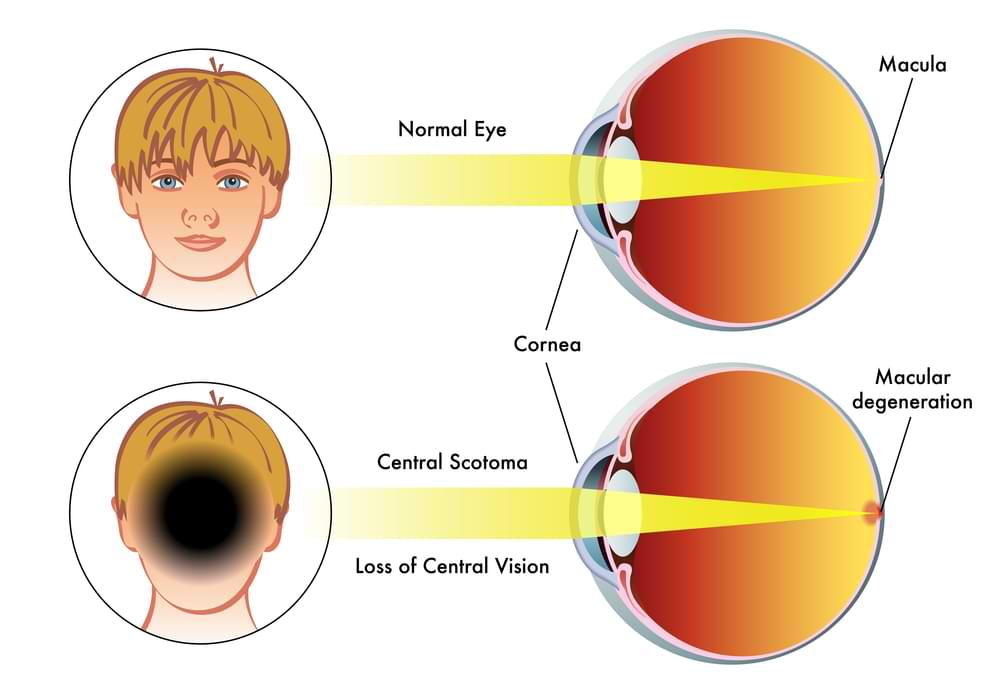Hobart Macular Degeneration Treatment
Have you ever wondered if those slight changes in your vision are just a part of getting older, or if they might be something more?
The truth is, when it comes to your eyes, it’s always better to be safe than sorry.
Many people in Hobart think that a bit of vision loss is inevitable as they age, and so they put off getting their eyes checked. But what if I told you that early intervention could make a world of difference?
I’m Martin Robinson, the owner and principal optometrist at Martin’s Eyecare. Along with my colleague Adam Barresi, we’ve dedicated our careers to safeguarding the vision of our community. We’ve seen too many cases where delay or neglect has led to preventable vision loss.
Neglecting your eye health or following misguided advice can lead to irreversible damage. Macular Degeneration, in particular, is a leading cause of vision impairment, and its impact only grows if left unchecked.
So, if you’re concerned about your eye health, or if you haven’t had an eye exam in a while, I invite you to book an appointment with us at Martin’s Eyecare today. Your vision is precious – let’s protect it together.
Or, if you’re looking to understand more about Age-Related Macular Degeneration and its treatments, keep reading.
Symptoms of Macular Degeneration (AMD)
AMD can subtly alter the way you see the world, often without any pain or discomfort, making it easy to overlook in its early stages. Here at Martin’s Eye Care, we want to help you recognize these early signs, so you can seek the necessary care promptly.
Let’s explore the common symptoms of Macular Degeneration:
- Blind Spots: Small, growing areas in your vision might seem empty, like persistent smudges.
- Poor Night Vision: Challenges in seeing during low-light situations, like evening walks, or after dark driving may signal a problem.
- Blurred Reading: Frustration arises when text in books or newspapers appears less clear.
- Dull Colors and Details: Everyday scenes, like the colors at Hobart’s Salamanca Market, may seem less vibrant.
- Contrast Issues: Difficulty distinguishing textures, such as pavement or stairs, is a common symptom.
- Trouble Recognizing Faces: Identifying people you know might become unexpectedly hard.
- Glare Sensitivity: Intense discomfort from bright light can be a symptom.
- Adapting to Light Changes: Taking longer to adjust from bright to dark areas is a notable change.
If you’ve noticed any of these changes in your vision, it’s important not to dismiss them.

Advanced Diagnostic Techniques at Martin’s Eye Care
In order to protect your vision, especially from conditions like Macular Degeneration, having access to advanced diagnostic techniques is crucial. At our practice, we pride ourselves on offering some of the most sophisticated and effective diagnostic tools available.
Let’s take a closer look at what we do:
-
Amsler Grid Test: This simple yet powerful tool is a cornerstone in the early detection of Macular Degeneration. It involves a grid of lines with a central point, which helps in identifying any distortion or blurring in your vision that might otherwise go unnoticed. It’s a quick and non-invasive test, but incredibly effective at catching early signs of trouble.
-
Dilated Eye Examination: By using special drops to widen your pupils, we can thoroughly examine the retina, the optic nerve, and other structures inside the eye. This examination is key to identifying not just Macular Degeneration, but a range of other eye conditions as well. Yes, it might leave you a bit sensitive to light for a short while, but the insights we gain are invaluable for maintaining your eye health.
-
Fundus Auto-fluorescence Imaging: This advanced imaging technique is a game-changer in eye care. Fundus auto-fluorescence imaging allows us to capture detailed images of the retina, highlighting changes that might indicate the early stages of Macular Degeneration. It’s like having a high-resolution map of the back of your eye, showing us exactly where and how to focus our treatment efforts.
Regular check-ups using these advanced techniques can help catch problems early, when they’re most treatable.
Understanding Macular Degeneration Stages
Being familiar with the stages of Macular Degeneration (AMD) is key to managing the condition effectively. At Martin’s Eye Care, we believe in educating our patients about what each stage means for their vision.
Let’s break down the stages:
-
Early-stage AMD: This is the initial phase where changes are happening in your eyes, but you might not even notice. What’s occurring here are medium-sized drusen deposits – these are tiny yellow or white accumulations of cellular debris under the retina. Interestingly, at this stage, there are no pigment changes in the retina, and more importantly, no loss of vision. It’s like the calm before the storm, which is why regular eye exams are so crucial. Catching AMD at this stage can make a significant difference in how we manage your eye health.
-
Intermediate AMD: Things get a bit more serious here. This stage is marked by larger drusen deposits and/or noticeable pigment changes in the retina. You might start experiencing some mild vision loss, but it’s also common for many people not to notice any major changes in their day-to-day life. However, don’t be fooled by the lack of symptoms – intermediate AMD is a sign that your eyes need attention, and potential treatments or lifestyle adjustments should be considered to help slow down the progression.
-
Late-stage AMD: This is the stage where the condition has advanced, leading to more significant vision loss. Late-stage AMD can be of two types – dry or wet. The dry form is more common and involves thinning and drying of the macula, which leads to a gradual loss of central vision. The wet form, though less common, is more serious and occurs when new, abnormal blood vessels grow under the retina, leaking fluid or blood, which can cause rapid vision changes. At this stage, the focus is on managing the condition to preserve as much vision as possible and adapting to changes in sight.
Statistics from a recent Australian study illustrate the extent of late stage AMD in our country among non-indigenous Australians.
|
Estimate |
Explanation |
|---|---|
|
0.96% |
Prevalence of late stage AMD in all non-indigenous adults 50+ years old |
|
1.40% |
Prevalence of late stage AMD in men 50+ years old |
|
0.61% |
Prevalence of late stage AMD in women 50+ years old |
|
6.70% |
Prevalence of late stage AMD in adults 80+ years old |
Table data from: https://www.ncbi.nlm.nih.gov/pmc/articles/PMC5710385/
Treatment Options for Macular Degeneration at Martin’s Eye Care
Making decisions about treatment for Macular Degeneration can be overwhelming, but we’re here to guide you through each step with understanding and expertise.
For advanced staged treatment we may refer you to an ophthalmologist who can perform some of the following procedures:
-
Anti-VEGF Therapy: This treatment is a bit like putting the brakes on the progression of wet AMD. It involves precise injections into the eye, which might sound daunting, but your eye doctor will ensure the process is as comfortable as possible. The goal here is to reduce the growth of abnormal blood vessels and slow down any leakage, bleeding, and subsequent vision loss. It’s an advanced approach to keep the more severe impacts of AMD in check.
-
Laser Therapy: This method involves using a focused beam of light to destroy actively growing abnormal blood vessels in certain types of wet AMD. It’s a targeted approach, aiming to prevent further damage from these vessels and maintain your current level of vision.
-
Photodynamic Therapy (PDT): PDT is a two-step treatment. First, your ophthalmologist will introduce a light-activated drug into your system. Then, the eye doctor will apply a low-level laser to the eye, which activates the drug. This combination targets and destroys the abnormal blood vessels in a controlled and precise manner. It’s like a one-two punch against the progression of AMD.
Other AMD treatments:
-
Vitamins and Supplements: For those with intermediate or late dry AMD, we often recommend a specific formula known as AREDS2. This includes a blend of vitamins C and E, zinc, copper, lutein, and zeaxanthin. It’s not a cure, but it can help slow down the progression of AMD. Think of it as part of your daily routine to support your eye health. It is an over-the-counter supplement.
-
Low Vision Aids: Dealing with vision loss can be challenging, but low vision aids can make a big difference. We offer devices like specialized magnifying glasses and electronic systems designed to help you make the most of your remaining vision. These tools can be life-changing, helping you maintain independence and enjoy your daily activities.


Lifestyle and Preventive Measures for Macular Degeneration
At Martin’s Eye Care, we understand that managing or slowing the progression of AMD isn’t just about medical treatments. It’s also about the choices you make every day.
Let’s explore some lifestyle and preventive measures that can make a real difference:
-
Healthy Lifestyle Choices: Simple changes in your daily routine can have a significant impact. Regular exercise, maintaining a healthy weight, and avoiding smoking are key. These habits help improve your overall health, which in turn can help manage or slow the progression of Macular Degeneration. Think of it as taking care of your whole body to protect your eyes.
-
Sunglasses and UV Protection: Protecting your eyes from harmful UV rays is more important than you might think. While sunglasses cannot prevent Macular Degeneration outright, they can reduce your risk of developing it and slow its progression if you already have the condition. It’s a simple yet effective way to care for your eye health, especially in bright environments.
-
Routine Eye Exams: I can’t stress enough the importance of regular eye exams. They’re not just for updating prescriptions. Routine exams allow us to catch early signs of Macular Degeneration, often before symptoms are noticeable. Early detection is crucial for effective management and can mean the difference between minor changes in vision and more significant vision loss.
If you would like to learn more about natural ways of preventing or slowing the onset of AMD, watch the following video from Dr. Audrey Tai.
Frequently Asked Questions
Can you stop the progression of Macular Degeneration?
While there is currently no cure for Macular Degeneration, there are treatments and lifestyle changes that can slow its progression significantly. Early detection plays a crucial role here. With regular eye exams, proper treatment, and certain lifestyle adjustments, many people successfully manage their condition for years.
How long does it take to lose vision with Macular Degeneration?
The rate at which vision loss occurs can vary greatly from person to person. Macular Degeneration typically progresses slowly, especially in its early and intermediate stages. The speed of progression can depend on various factors, including the type of AMD (wet or dry), overall health, and how well the condition is managed. Regular check-ups and following your treatment plan are key to preserving vision.
Can I live a normal life with AMD?
Absolutely. Many people with Macular Degeneration continue to enjoy a wide range of activities and maintain a high quality of life. Adapting to changes in vision, utilizing low vision aids, and making certain lifestyle changes can all help. It’s about managing the condition proactively and staying engaged with your eye care.
What speeds up Macular Degeneration?
Certain factors can accelerate the progression of Macular Degeneration. Smoking is a major one – it significantly increases the risk. Poor diet, lack of exercise, and excessive exposure to sunlight without proper eye protection can also contribute.
Is Aged Related Macular Degeneration hereditary?
Age-Related Macular Degeneration (AMD) can have a hereditary component. Research suggests that genetics play a role in the development of AMD, meaning that individuals with a family history of this condition may have a higher risk of developing it themselves.
However, it’s important to note that while genetics is a significant risk factor, it’s not the only one. Other factors such as age, smoking, diet, and exposure to sunlight also contribute to the risk of developing AMD. Therefore, even individuals without a family history of AMD should be mindful of these other risk factors and maintain regular eye exams, especially as they age.
Conclusion
Let’s recap the crucial points we’ve covered. Early detection through regular eye exams at Martin’s Eye Care is key to effectively managing this condition. We use advanced diagnostic tools like the Amsler Grid Test, Dilated Eye Examinations, and Fundus Auto-fluorescence Imaging to ensure accurate diagnosis and monitoring.
While there is no cure for Macular Degeneration, a range of treatments, including Anti-VEGF Therapy, Laser Therapy, Photodynamic Therapy, and nutritional supplements, can significantly slow its progression. Equally important is the role of lifestyle in maintaining eye health. Simple changes such as a nutritious diet, regular exercise, wearing UV-protective sunglasses can contribute to the health of your eyes.
Our collaboration with ophthalmologists for more advanced cases ensures that you receive comprehensive care. Remember, living with Macular Degeneration doesn’t mean giving up the activities you love. With the right management, support, and adaptive tools, life can be rich and rewarding.
Macular Degeneration doesn’t have to be a daunting prospect. By taking proactive steps in eye health and regular check-ups, you can make a real difference. At Martin’s Eye Care, we’re more than just optometrists; we’re your partners in maintaining and enhancing your vision for as long as possible.
